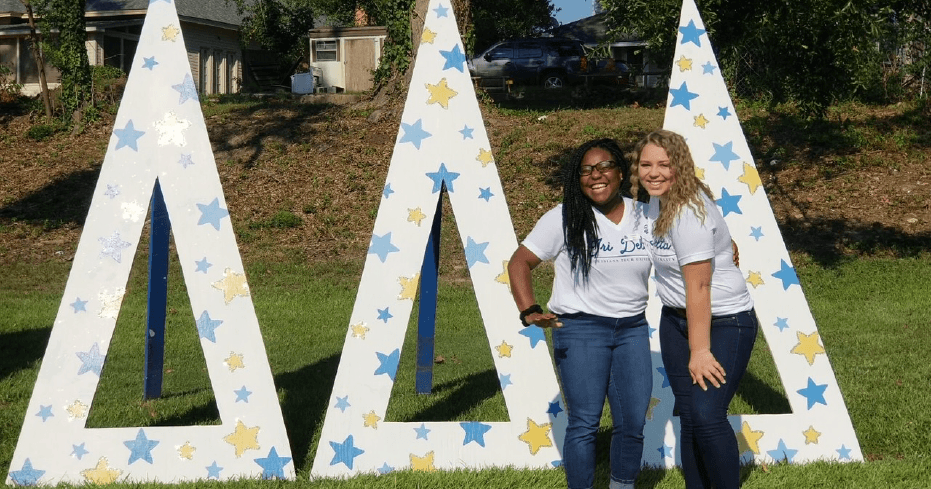One year ago, as COVID-19 reached pandemic status, the world faced mass shutdowns of businesses and schools, mandatory quarantines and new mask and social distancing protocols…fundamentally changing the way we work, learn, communicate and socialize.
No one was more affected by this societal shift than women. Working mothers had to juggle careers with overseeing their children’s virtual education; others had to balance the responsibilities of caring for aging parents, and some had to overcome the obstacles of extended quarantines. College seniors were confronted with the challenge of graduating and finding jobs amidst a worldwide pandemic. And women entrepreneurs were faced with reinventing business practices to meet the needs of a new virtual world.
As we mark one year of the COVID-19 pandemic, Tri Deltas are sharing their stories of how the pandemic has affected their lives, what they’ve learned through the experience, and how Tri Delta has been there to support them through it all.
Parenting in a Pandemic
On March 7, 2020, just two weeks before the COVID shutdown, Megan Shaw James, Millsaps, received a call from Tri Delta’s Leadership Development Committee asking her to serve as Fraternity President for the 2020-2022 biennium. “It was one of the happiest moments of my life, and the biggest honor,” she remembers.
Fast forward two weeks and Megan, who works full time in alumni engagement, found herself in a situation familiar to most working mothers: navigating a full-time career while also helping her two children—including her son who has two learning disabilities—through virtual school. “I had to be his advocate and figure out how to provide accommodations for him in the virtual setting.”
During this time, a reduction in the workforce at her job meant Megan was taking on additional responsibilities. Working in alumni engagement, Megan and her team had to rethink in-person engagement, support and events because of social distancing.
Caregiving During COVID
Megan is also part of what is referred to as the “sandwich generation”—she’s raising her children while also caring for aging parents. The James family experienced a devastating loss last year when Megan’s father-in-law passed away unexpectedly. Then, during the week of Tri Delta’s Virtual Convention—the same one where Megan would officially be voted and sworn in as Fraternity President—her mother was diagnosed with dementia.
For Megan, this experience illustrated the dichotomy of life and the emotions that you can hold at the same time. “You can have such joy, while experiencing grief or sorrow at the same time.”
As a working mother, she acknowledges that even before the pandemic, moms were having a hard time juggling it all—COVID-19 just brought on new challenges.
“Due to restrictions related to quarantines and social distancing, we’ve lost a big network of family and friends that would normally be there to help out. It’s important for us as mothers not to blame ourselves. Mothers didn’t create this pandemic, but we are navigating it for ourselves and our families. And, we’re all doing our very best.”
Extending Grace, Practicing Self-Care
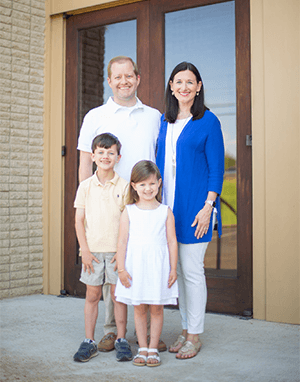
Through it all, Megan found the importance of extending grace to herself and to others, and finding moments that bring renewal. “For every individual, that will be different. For me, it was perhaps listening to an audiobook. I love to read, but it’s hard to find a moment to sit down with a book. Instead, I’ll pop in an audio book for five minutes.”
She was also inspired by Tri Delta’s Walking With Purpose initiative to get outside and walk as another form of self-care. And listening to the Let’s Talk Tri Delta podcast while walking makes her feel like she’s physically walking with a sister. “The podcast introduced me to Tri Deltas who I haven’t been able to connect with in person.”
She’s also found other ways to connect with sisters. She and a couple of close Tri Delta friends have started a group text to stay in touch. “Before the pandemic we would see each other about once a year, or touch base once a month. Now we have this group text. That has strengthened our perpetual bond of friendship.”
She credits Tri Delta with giving her the confidence needed to navigate this challenging season of life, whether it’s advocating for her child, or speaking up to say “I need help.”
“Tri Delta has given me the foundational value of being able to speak the truth and speak it with kindness … and that is so important for working mothers as we set boundaries—to speak truth, be sincere and to do so with kindness for ourselves and for others.”
Motherhood Times Three
Another Tri Delta, Meagan Yee, Carnegie Mellon, has had to navigate the pandemic as a new mother of triplets born last summer. Originally, Meagan and her husband were looking forward to having her mother stay a couple of months after the babies were born to help out. But COVID-19 altered their plans. Safety concerns, coupled with travel restrictions, prevented Meagan’s mom from making the trip.
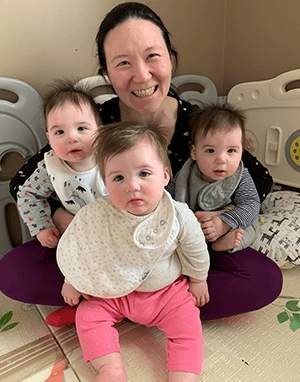
“That totally threw a wrench into the way we thought things were going to go,” says Meagan. “We were trying to figure out how to take care of three little ones when we are outnumbered.” Instead, Meagan’s mother-in-law who lives four hours away has been able to stay with them for a week at a time to help care for the babies.
Because the triplets were born prematurely, the family had to be especially cautious of potential exposure during the pandemic. That meant Meagan’s friends and Tri Delta sisters in the area who would have normally visited weren’t able to, and missing out on this social interaction and support has been a challenge.
“I wish we could have our friends over and have their kids come over and play with the babies. I also think about how this may affect them. Hopefully not too much because they’re still so little, but it would be so nice if we could meet up with other moms and babies.”
Meagan also says the lack of time with family and friends has made the experience feel a lot more isolating. “We never leave the house, and I can’t figure out if it’s because of the pandemic, or if it’s because there’s three of them and only two of us.” She adds, “It’s hard for me to picture what it would be like being a new mother of triplets without the pandemic.”
Finding the Bright Spots
One of the surprising benefits that has come from the pandemic for Meagan is that her husband is now working from home full time. That means he can spend additional time bonding with the babies and providing more help and support. “It’s been a huge blessing that he gets to experience this time in the babies’ lives,” she says.
The other bright spot has been that despite not being able to see people in person, Meagan has still felt so much connection and support from her Tri Delta sisters. After the babies were born, her Tri Delta sisters organized a meal train for the family.
“It was so nice to have all these wonderful sisters stop by with meals,” says Meagan. “It was bittersweet knowing that if times were different we would have had them meet the babies. Instead, it was a porch drop-off. But it made those early days easier not having to worry about cooking meals.”
Social media has also helped Meagan form connections with sisters. “There are a lot of sisters I had formed relationships with throughout my volunteer work before I had the babies. Now I feel closer to them because of the connections happening when I post pictures and updates of the babies on Facebook. It’s been so nice having people give advice and words of encouragement—that’s been huge!”
Quarantining During COVID
On March 12, 2020, Carrie Green, Southern Methodist, and her husband made the decision to drive to Fayetteville, Arkansas, to pick up their daughter, Grace, from the University of Arkansas where she was a freshman. What they didn’t realize was once they returned to their Dallas, Texas, home, the family would not leave their house for the next 11 months.
“We thought it would be two weeks,” remembers Carrie. “Grace packed an Easter dress, and I ran to the store to get groceries so the fridge would be full.”
Grace, who was born prematurely, is immunocompromised after a lifetime of hospital stays and more than 25 surgeries. Her doctors all said the same thing: If she were to get COVID-19, she probably wouldn’t survive the disease. Their advice to the Greens was “Shut the doors, don’t let anyone in, and don’t leave the house.” So that’s what precisely what the Green family did.
They made the most of their time at home, finding ways to stay connected with friends and family. Carrie participated in several virtual events hosted by the Dallas Tri Delta Alumnae Chapter, and Tri Delta sisters organized socially-distant visits for her birthday by sitting on her back patio and talking through a glass door.
Friends, sisters and neighbors were also on hand to provide support. In the early days of the pandemic when paper products were scarce, neighbors made sure the family had all the supplies they needed. In return, Carrie baked goodies—like homemade donuts—to share. A Tri Delta sister even went to the salon to work with Carrie’s stylist to provide her with shampoo and color for her hair.
Paying It Forward
It was also important to Carrie and Grace to spend time giving back and supporting the community. “We found ways to still be involved in community that was safe for us. Sitting at home and just focusing on us and our situation isn’t good for anyone. We love being able to help in whatever ways we can.”

Over the summer, they made sandwiches for kids participating in their church’s summer programs. For their church’s school, they participated in a Zoom reading with a class once a month.
For the holidays, Carrie and Grace continued their annual tradition of participating in the Dallas Alumnae Chapter’s Cookies & Castles fundraiser, supporting Scottish Rite Hospital for Children. It’s a cause close to Carrie’s heart. Grace was a patient at Scottish Rite Hospital and the two have been attending Cookies & Castles for years.
This year since the event was a drive-through, Carrie purchased the gingerbread houses for decorating and a friend picked them up and dropped them off at their house. “We had so much fun making them at home. It was great just being able to do the somewhat normal routine we were used to doing.”
Winter Storm 2021
The Greens initially had not intended to leave their house until the pandemic was over, but mother nature had other plans. In mid-February, a winter storm hit Dallas causing a pipe to burst and flood their home. The family was forced out of the house they had stayed inside for nearly a year. But once again, friends and Tri Delta sisters were there to offer support and a safe refuge.
A friend who had lost their father to COVID-19 still had their father’s home sitting empty and offered it to Carrie and Grace as a place to stay and continue quarantining for as long as needed. Meanwhile, Carrie’s former Tri Delta advisor provided her garage apartment for Carrie’s husband to live in while he oversaw the repairs to their house.
Through it all Carrie has remained upbeat and positive. “We’ve just tried to find the silver linings,” she says. “We’ve been thankful for our friends, faith and family.”
The most recent silver lining came as the family was able to receive the COVID-19 vaccine. But even with being vaccinated, Carrie says they will continue to isolate and take precautions with the rise of new variants of the virus and data still being gathered on the efficacy of the vaccine for immunocompromised individuals, like Grace. But it will finally be safe enough for Carrie to visit her parents (who live 10 minutes away) for the first time in a year.
“We just try to find the joy in every day,” says Carrie. “It makes life easier when you can find the positives and focus on the things you have and are grateful for.”
Business Ownership and COVID
While the pandemic affected everyone’s daily lives, many business owners have had to come up with creative solutions to meet the changing demands of a society that has been forced into mostly virtual interactions.
Melissa Muller, Wichita State, saw this play out firsthand. She owns and operates a private piano studio. COVID-19 forced Melissa to close her business for a short time, losing about 50% of her clients. Once she reopened, she had to reconfigure her entire business model for a new virtual world.
Using a digital platform Melissa was able to continue teaching piano lessons virtually, although the experience took some adjusting.
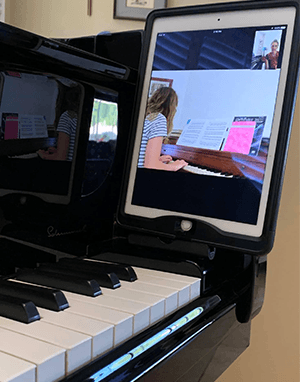
“One large shift was how I taught. When one teaches in-person, you watch over a student’s shoulder. You listen, but moreover, you can see when a student makes a mistake,” Melissa explains. “With virtual lessons, I am 98% reliant on my aural skills. Ironically, aural skills was the class in college that I despised the most. During the class, you listened to a melody line and had to notate it. The class also embraced sight singing on key. The same skills I learned in that class over 20 years ago is what I employ now teaching virtual piano. I can’t really see where the student’s hands are always on the keyboard, so if they are playing B flat but are supposed to play a D, I have to be able to aurally identify the error and help the student reposition their hands verbally. The lesson here is that you should always pay attention in class because you never know when you may need it!”
Offering virtual lessons has led to more opportunities. “I have expanded my business to include students all over the United States since all are more open to virtual opportunities. I started a new student (new to piano, too) who lives in New Jersey!”
And, because they’re spending more time at home students are practicing more, moving through music quicker and increasing their lesson time.
What Melissa has found is that parents like having the consistency in piano lessons for their children. “Parents have discovered that piano provides some normalcy in their child’s life when so much has been taken away.”
Graduating During COVID
Victoria Ned, Louisiana Tech, was set to graduate in May 2020 with a degree in human development and family studies and plans to pursue a graduate degree in clinical and mental health counseling. Unfortunately, COVID-19 changed those plans.
Part of her graduation requirement was 120 hours of in-person work at a childcare center. But with the shutdown, she was unable to complete the required hours.
Victoria had already faced many challenges on the road to completing her degree. Health complications led to surgery three years ago. She was also juggling school with helping care for her younger brother, who has autism, and her mother, who is disabled.
Shortly after the onset of the pandemic in April, Victoria received a call while she was in the middle of taking a quiz for class: Her cousin had passed away from COVID-19. It was a devastating blow for Victoria, who is close with her family.
“When I got the news, my heart fell out of my body and I couldn’t breathe. It was a really hard week and month.” She remembers her cousin as being, “The one who always kept us laughing. You can’t image family functions without him.”
As Victoria faced the stress of trying to graduate while also dealing with the grief of losing her cousin, she admits, “It was a lot to deal with. I started going to counseling and ended up finding a really great counselor who talked me through the grief.”
Getting to Graduation
Her impending graduation was pushed to summer, and then pushed again to fall. There were miscommunications with professors and a lot of high emotions. “I kept thinking it’s never going to happen. I’m never going to get through it. I’m never going to graduate.”
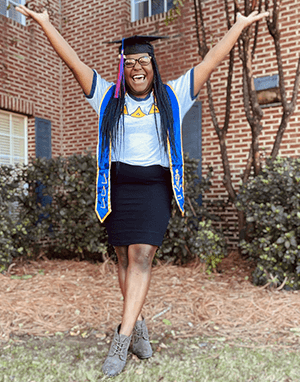
Finally, during the fall semester, she was able to get a placement at a childcare center. She completed the required 120 hours in just three weeks, working 7 a.m. to 3 p.m. every day. The opportunity let Victoria prove herself to her professors, and gave her the confidence in knowing she could be successful.
“I think [my professors] have always seen me as the student who was always sick, who had to take time off or had to leave class to care for my mom and brother. I really surprised them. I kept getting comments about how great I was with the kids and how the kids wanted me to stay. They ended up writing me a really good student evaluation.”
“It was reassuring to me that I knew what I was doing. I had self-doubt, but the experience lifted me up.”
Finally, in November Victoria received her diploma and officially graduated. She was able to celebrate with her family over Zoom. Her next step? Applying for graduate school.
Making Grad School a Goal
Victoria applied to Nova Southeastern Department of Counseling. Typically, the time from applying until the university makes a decision is two weeks. Victoria heard back within three days—she had been accepted!
She received her acceptance letter on the same day she, her brother and father, tested positive for COVID-19 in December. “I’m big on signs,” she says. “I thought ‘well, this is either going to be the start of something really great, or I’m not going to make it there.’”
COVID was a struggle. She and her brother quarantined together at her apartment, and she looked after him while battling the illness herself. “I couldn’t breathe. I had a fever running from 100-102 every day, no appetite. It felt like somebody was choking you from the inside.”
Tri Delta sisters stopped by to make sure she was ok and to bring her cups of ice from Sonic—her favorite. Thankfully, by New Year’s Day, Victoria, her brother and her father had all fully recovered from COVID-19.
Now, one year after the pandemic threw her future into uncertainty, Victoria is halfway through her first semester of graduate school at Nova Southeastern. Reflecting on the past year, Victoria believes the experience gave her a greater sense of confidence.
“I think the main thing is I gained the self-confidence I’ve never had. It’s never been this strong.”
She also credits Tri Delta with providing her the support structure needed to succeed, whether it was relying on sisters when she was sick or having someone to study with and talk through grad school plans. Victoria also received a Collegiate Crescent Fund Grant from Tri Delta’s Foundation, which provided financial support to help her graduate. “Tri Delta made me feel like I had a community I could fall back on when I was going through a hard time. I’m really thankful for my decision to join Tri Delta and stay in Tri Delta. It has been one of the best experiences of my life.”
Do you know a Tri Delta sister in need? Learn more about requesting or donating to support emergency assistance from Tri Delta’s Foundation.

